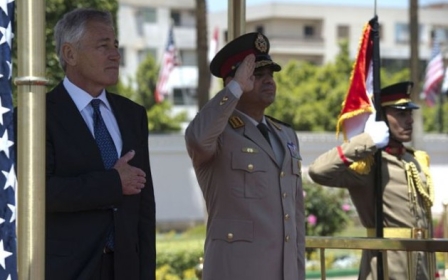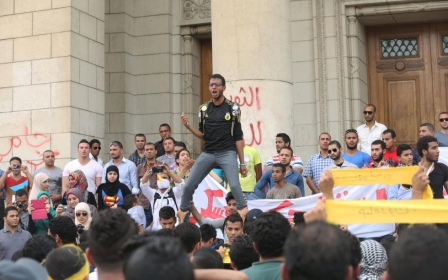African Union orders Egypt to suspend mass death sentence

Africa’s highest judicial authority ordered Egyptian officials to suspend the death sentences of 529 Egyptians and to investigate the rulings, just days before a final verdict in the case is due.
Accused of various crimes related to an attack on a police station in Minya in August 2013, most of the defendants were tried in absentia and without legal representation, in proceedings that lasted less than an hour, according to lawyers who have lobbied the African Union to intervene.
In a letter sent on Friday to Egyptian President Adly Mansour, the African Union's Commission on Human and People's Rights said that if allegations of the trial proceedings of the defendants are true, the country is in gross violation of regional and international human rights standards.
"It is highly unlikely that the mass trial observed the standards of a fair trial," wrote the commission's chairperson, Zainabo Sylvie Kayitesi.
Egypt is a signatory to the African Charter, a human right’s instrument of the 54-member African Union, which rejects the death penalty and protects rights to a fair trial. The commission's letter orders Egyptian authorities to suspend the death sentences, observe the Union's moratorium on the death penalty and grant the defendants the right to appeal in accordance with the charter.
Kayitesi also notes in the letter that the case represents the highest number of people sentenced to death in a single trial recorded in the recent past.
The commission's intervention follows a request for help earlier this month made by lawyers acting for the Muslim Brotherhood’s Freedom and Justice Party.
“The procedures in Egypt have been random and arbitrary,” said Rodney Dixon QC of Temple Garden Chambers in London, one of several lawyers involved in the request. “No proper legal procedures were followed in the trial."
The security force shooting of unarmed protesters around Rabaa al Adawiya mosque and other protests and sit-ins in Cairo in which at least 638 were killed on a single day last year set off a blacklash around the country. On 14 August, a police station in Minya, 250 kilometres south of Cairo, was attacked, the deputy police chief lynched and the homes, businesses and churches of Christians who make up half of the population of Minya were set ablaze.
The court in Minya is scheduled to reconvene on Monday to issue a final verdict after it has been ratified by Egypt’s Grand Mufti who must be consulted on all death sentences under Egyptian law.
Dixon said the communication sent to the AU and the commission's intervention has potential wider ramifications for all those who have been detained under the current judicial system.
“The trial of the 529 shows that there is no judiciary in Egypt that is functioning according to recognised international standards,” he said. “Yet the authorities have only focused on prosecuting those who have opposed the coup, but without giving them any fair and genuine opportunity to defend themselves.”
The exact number of people arrested and detained since the July 2013 coup is disputed. The FJP’s legal team estimate the total is 20,000 people. Rights activists, think tanks and lawyers who defend protesters say the number is lower, around 16,000 to 17,000; a statement released earlier this month by detainees says it is higher than 20,000.
The sentence has attracted international condemnation. At the time of the sentencing, Catherine Ashton, European Union's High Representative for Foreign Affairs and Security Policy, expressed "the EU's utmost concern" about the mass death sentence, said Michael Mann, a spokesman for the High Representative.
"These concerns were firmly reiterated by the High Representative during her meeting with the Egyptian Foreign Minister Nabil Fahmi in Brussels on 31 March, and with all the relevant authorities in the course of her mission to Cairo between 9th and 11th April," Mann said.
The EU, he said, believes that capital punishment can never be justified, and that a fair trial must always be ensured, as well as adequate detention conditions.
Asked whether it was wise for Ashton to have taken her family to Luxor for a holiday this past Christmas and what this holiday said about the values she places on human rights, Mann said the December trip was "an exclusively private visit."
Beyond embarrassment, the AU’s diplomatic intervention has potential economic consequences. If Egyptian officials refuse to comply with the commission's request to suspend the death sentences, the commission can then refer the case to the African Court on Human and People's Rights which, in turn, can refer the case to the AU's Assembly of States at which point sanctions could be imposed on the military-backed government in Egypt, said human rights lawyers familiar with the African Union.
The AU has publicly expressed dissatisfaction with Egypt several times over the past year. Two days after Morsi’s 3 July overthrow, the AU’s Peace and Security Council (PSC) suspended Egypt’s membership.
“The council expresses deep concern at the risks the prevailing situation poses for the long term stability of Egypt and cohesion of its people, with far-reaching national and regional consequences,” the PSC said in a statement at the time.
The AU may well shun Egypt’s upcoming presidential elections, scheduled for 26-27 May, because former army chief Abdel-Fattah al-Sisi is running.
In a confidential memo circulated among members of AU’s Peace and Security Council, Chairman Bulus Paul Lolo said as a result of Sisi’s leadership in the overthrow of Morsi while he served as defense minister, his bid contravenes the AU’s charter.
Egyptian officials have 15 days from their receipt of the commission's letter to respond.
"Considering the commitment of the Arab Republic of Egypt to the cause of human rights," the commission's letter ends, " . . . I have no doubts that the present decision on provisional measures will be followed by a positive response."
Middle East Eye propose une couverture et une analyse indépendantes et incomparables du Moyen-Orient, de l’Afrique du Nord et d’autres régions du monde. Pour en savoir plus sur la reprise de ce contenu et les frais qui s’appliquent, veuillez remplir ce formulaire [en anglais]. Pour en savoir plus sur MEE, cliquez ici [en anglais].




